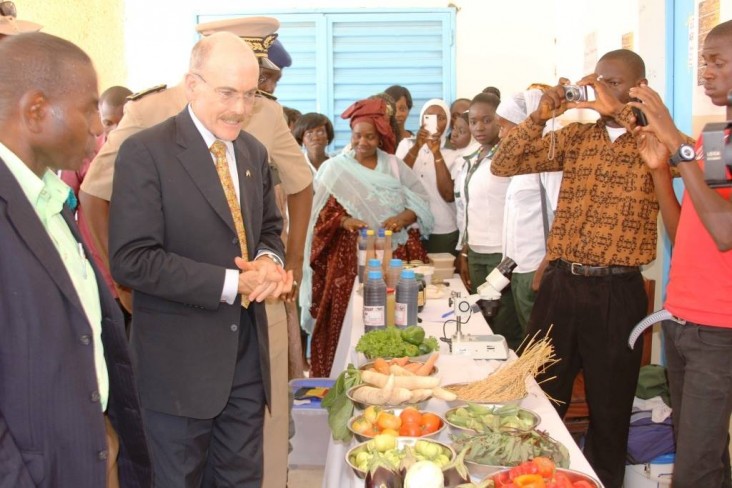
U.S. government projects in Casamance provide key support to the Government of Senegal and the people of Casamance in bringing bring peace, stability and economic prosperity to the region, U.S Ambassador to Senegal James Zumwalt, concluded following his first visit to Ziguinchor from April 22-24.
Several American agencies are active in Casamance, particularly through support to farmers to increase production and market their products, and improving access to education and health care, and renovation of road infrastructure.
“Through this assistance, the United States is helping Senegal promote balanced and sustainable recovery of socio-economic activities but also build peace in Casamance,” Ambassador Zumwalt said.
The visit provided the Ambassador’s both an opportunity to meet authorities in the region and to take stock of the various U.S.-supported community development activities on the ground.
Local authorities and communities join hands for better health
At the Health Post in Nema2, a district covering over 21,000 people near Ziguinchor, Ambassador Zumwalt noted the commitment and leadership of local authorities and the Health committee, and the community maintaining efficient management of a facility that has been recording impressive results.
"Combining the community’s resources through the health committees and local government has led to healthier community,” chief nursing officer Mamadou Lamine Coly told the Ambassador, noting a marked reduction in unassisted home births and malaria in the last three years. "This is a big post, and we are able to handle patients who come from long distances for treatment.”
Women as a vehicle for peace
Women bear the brunt of all conflicts, and Casamance is no exception. Interested in the role that women have played in the conflict, the Ambassador met with the Platform of Women for Peace in Casamance (PFPC) at their headquarters in Ziguinchor.
The group’s leaders said a lasting resolution of the Casamance conflict and the emergence of sustainable peace is crucial in any initiative undertaken in this region.
PFPC coordinator Ndeye Marie Diedhiou Thiam said her organization, formed in 2011, welcomed the support that USAID gives them to help implement their activities.
Representatives of 170 associations that make up the platform also commended the other interventions of the American government or people in general in the socio-economic sectors in Casamance.
For his part, Mr. Zumwalt congratulated the women for the results achieved within the framework of UN Resolution 1325 which recognizes that “conflicts affect women differently than men, and that woman must actively participate in their resolution and the consolidation of long-term peace.”
“We will continue to support your efforts for conflict resolution and promoting peace and development in Casamance," the Ambassador said. “I applaud your dynamism and enthusiasm.”
Peace Radio
Dozens of residents of Sindian, about 50 km north of Ziguinchor, were on hand on April 24 for the unveiling of a commemorative plaque at Fogny FM, known as Peace Radio.
Ambassador James Zumwalt welcomed the lasting impact the U.S-supported Fogny FM has had on the lives of people in the community and beyond borders in the Gambia for the last nine years.
"The Peace Radio is an excellent example of how the American government can work in partnership with local communities to stimulate local initiatives and advance the community development objectives," he said.
“Radio de la Paix” plays a key role in promoting conflict resolution, Casamance culture and public services in and around the Sindian community, helping encourage people, who then sought refuge in neighboring Gambia, to return home.
Created in 2006, Fogny FM is part of a network of community radio stations supported by USAID through its Peace and Governance Project (USAID/PGP) to promote women's leadership, youth participation in public service messaging and cultural programs, and encourage communities to support a lasting solution to the Casamance conflict.
Stations in this network all help to promote the development of local democracy, good governance, and a better understanding of the responsibilities of local authorities.
Agricultural education and community service
Finally, the ambassador visited the agricultural technical high school Emile Badiane in Bignona at about 30 km from Ziguinchor, which is supported by USAID’s Education and Research in Agriculture project (USAID/ERA).
School principal Ibou Diedhiou highlighted changes in the school made possible by support from USAID such as improved teaching methods, a student exchange program, adoption of an institutional assessment process, and a collaborative partnership between institutions with common interest in agricultural education and service to the community.
During the visit, the ambassador inaugurated a fully-equipped “incubation room” for entrepreneurial projects called "Business Plan Box" provided by USAID.
Principal Diedhiou said the support has permitted the school to integrate community service in its curriculum. "Not only do the students engage in activities giving back to their communities, but we can train unemployed youth to work on the school garden to make a living,” Diedhiou said.
The Ambassador also visited an exhibition of the students’ harvest including irrigated rice, produced for the first time. Alumni like Dieynaba Badiane and other small entrepreneurs shared experiences.
Dieynaba explained to Ambassador Zumwalt how her small millet and maize transformation business operates. "Thanks to the skills I earned here, I transform millet into couscous and package them commercially,” Dieyanaba said. “I also sell dried mushrooms I grow.”
Founded in 2000, the school now works closely with producers and small and medium enterprises among others in the processing and conservation of products.







Comment
Make a general inquiry or suggest an improvement.